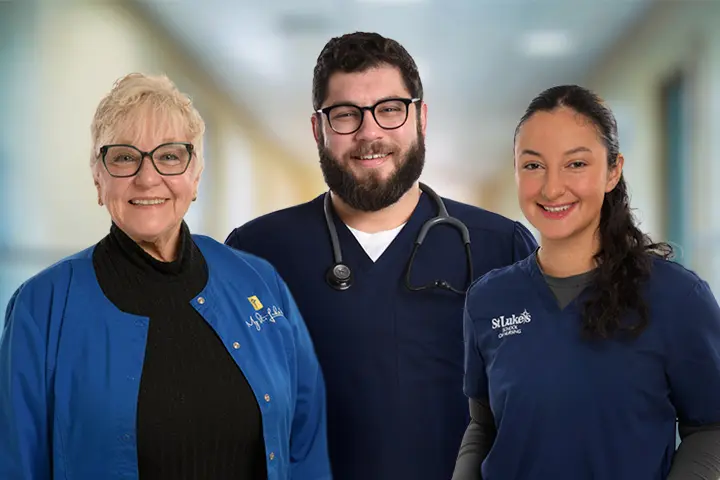

 Quality Awards
Quality Awards

Left to right: Sue Willis, Brian McCloskey, Anna Bitar
On December 12, 68 students will graduate from St. Luke’s School of Nursing in Bethlehem, the nation’s oldest continuously operating nursing school. Founded in 1884, this will be the 167th class in a 140-year history that has educated women and men to join the world’s most trusted profession.
Brian McCloskey of New Jersey will achieve his longtime goal of becoming an RN in December, something he’s desired since he was diagnosed with Type 1 diabetes in middle school when he needed to learn to live healthily with the chronic disease.
“I’m very excited to graduate and use my education and bedside experience to take care of patients in the St. Luke’s ICU,” says the 31-year-old student, one of the few males in the 167th graduating class. McCloskey started at St. Luke’s as a patient care assistant in 2016, became a licensed practical nurse in 2020, and now is taking his ultimate career step by earning his RN, taking advantage of the school’s generous and popular tuition reimbursement program.
“I love both the school and the Network,” said McCloskey, whose mother works in the quality department for St. Luke’s.
The school’s first graduating class, in 1888, comprised two women; the December 12 class consists of 61 women and seven men. Their completion of 20 months of rigorous education in this program will bring the total number of graduates from the School of Nursing to 5,364 in its history. According to Lisa Storck, senior associate dean of the school, 65% of these graduates will go on to launch their career at St. Luke’s, many of whom will stay for decades.
St. Luke’s School of Nursing Video
Sue Willis, RN, class of 1974, is celebrating a half-century working at St. Luke’s, calling it, “a gift that keeps on giving.”
The Bethlehem woman followed her mother at the school and the hospital and preceded her sister there, too. In 1980, Willis met her future husband, Johnnie Willis, MD, at the hospital when he was a first-year resident in OB-GYN. They’ve been married since 1995.
“I’ve loved every minute of working here,” says Sue Willis, the 71-year-old who works per diem and says of the organization, “I just can’t give it up.”
The School of Nursing offers day and evening/weekend track options, which require 900 hours of clinical experience. Each student is eligible to attend the school tuition-free in exchange for 16 hours of work weekly at a St. Luke’s hospital, along with a commitment to remain in the Network for at least two years following graduation. This scholarship has been offered to all students since COVID.
Many St. Luke’s nurses, like Willis, enjoy career-long positions here, during which they’re able to learn new skills, change jobs and/or qualify to move into management ranks in the Network. Sometimes a nurse’s employment can span several decades or more after graduation from the School of Nursing.
The School of Nursing training, and other opportunities—professional development, internships, flexible work schedules and fellowships—help attract and retain these vital professionals in the Network, which employs a total of 4,200 nurses in clinical, educational and administrative positions. This enables the Network to maintain an impressive nurse vacancy rate of just 11% compared to 14% state-wide in Pennsylvania.
Anna Bitar, 21, the youngest nursing student who will graduate in December, is sometimes playfully referred to as “the baby” by her classmates, but it doesn’t faze her a bit. Some of her fellow students’ ages range up to the 50s and 60s.
Bitar, who also works as a patient care assistant, admits the nursing school pace and curriculum were “a little scary in beginning,” but adds, “I like to do uncomfortable things, throw myself into something new.”
She was inspired to go to nursing school after being a hospital patient herself and realizing the lasting impact nurses have on patients.
“You may forget a nurse’s name, but never their face or how they treated you during their most vulnerable time,” says the Bethlehem resident, a first-generation American born to Syrian parents. “My parents have supported me and had my back in every way.” She will become the first nurse in her family.
Following graduation, Bitar will continue to work and learn on the neurology unit where she had her start as a patient care assistant with a dream, but no prior healthcare experience.
“I love challenges, and becoming a nurse has been the ultimate challenge for me, but it has paid off with its many rewards and many more to come.”
According to Ashley Swope, RN, the Network’s chief nursing officer, “Combining the popular and thorough School of Nursing training, and other recruitment and retention programs, we have created a winning, multipronged staffing strategy for nursing.
“Review the Network’s many accolades for patient-care quality, and it’s pretty obvious that the St. Luke’s strategy is working.”